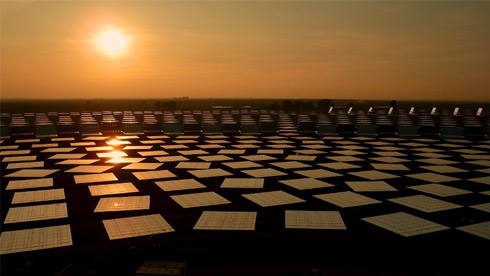The power came from the pictures. First there was the sun, the hope for salvation from the energy dilemma ever since nuclear power tanked. Then the desert: distance, space, infinity – and an infinity of ideas as well. The Desertec desert power project, which was to provide Europe with power from the Sahara, struck many people as the greatest green idea of recent years. The pull was so strong that the corporate world lined up in a queue to sign on: Siemens, Deutsche Bank, Munich Re – around 50 companies from Germany and abroad.
The appeal of the project, though, is waning. Key stakeholders have bailed out, and a managing director who wanted to hold onto the great plan until the last minute had to go. Was the whole thing nothing more than a PR project overloaded with dreams, a great idea brought low by posturing?
It would be wrong simply to abandon the project as another one that just didn’t pan out. Desertec and the lessons learned from it point the way towards the future of environmental policy, indeed towards success or failure in many policy areas that have to operate with great unknowns.
It takes many minds to save the world
First lesson: engineers, managers, and scientists cannot substitute for a policy. It is indeed attractive to see the world or a map as a piece of paper on which large and small lines can be drawn at will. Those who want to carry out a major project, however, are well advised to worry first about political players and their interests, national borders and regions. Inhabitants and neighbours must be brought in. As long as not every partner can be given a realistic idea of what he will get out of it, or at least of what he is facing, there is a potential opponent in the making; and quite quickly, just a few opponents are too many. Where regimes are in transition, as in North Africa, today’s negotiating partner may be gone from his desk tomorrow. He who, caught up in the energy revolution, boldly plans power lines to run across a country should heed that as well.
Second lesson: public relations should not be confused with the political dialogue and political process. PR is a lot of hype: PowerPoint presentations, corporate videos, advertising campaigns. Happy faces interposed between insulation panels, solar collectors, in the E-car, or out in the desert sun. That’s where the professional consultants have their day. Success in PR is measured solely by whether the client succeeds in pushing his plan through in the end. The political process, on the other hand, usually ends in a compromise. That is what now awaits the Desertec project. First, the North African countries themselves must be self-sufficient. And that wouldn’t be so bad at all. The result would then be very different from what was on the drawing board, but it would be backed by those who are directly involved.
[[Some in the eco movement want environmental policy modelled after those in authoritarian states like China]], whose leadership cadres push through their policy ideas. Experience shows, though, that it is never a single clever mind that saves the world. Rather, it is saved by plenty of minds, which come up with ideas. Participation and balancing conflicting interests may delay some decisions, but they make those decisions more stable. Technologies can certainly be imposed from above. But if a policy is to be sustainable, it must change consumption patterns and attitudes, predilections for innovation, and production processes.
Thinking big
Third lesson: small, decentralised and reversible overrides large and centralised. If one persists with the claim that growth should be designed to be intelligent and environmentally friendly, a question comes up: who decides what is intelligent? Proponents of nuclear power, for example, once thought they had found the key to a clean source of energy that could be tapped into forever. What remains is only the emergency: what to do about the future ruins of nuclear plants and their waste?
What technology will prevail and what will be pushed the way of the dinosaurs by newer technology will be never predictable. In his book The Third Industrial Revolution, sociologist Jeremy Rifkin claims that the potential of solar energy based on decentralisation is revolutionary. Everyone can be an energy producer from his own house, he writes. Soon there should be opportunities to put solar panels on roof tiles or in the plaster of houses as standard fittings. And then who will need power that has to be transmitted across continents?
Small, decentralised projects not only have the advantage of being easier to adapt to changing circumstances: they can be also the germ cells of innovation and tests for acceptance.
Fourth lesson: big visions spin off small projects and ideas. The €400bn plan was launched to bring electricity from the Sahara to Europe, and now there are only power plants in Africa. A disaster? Hardly for the people there, who benefit from it. Sometimes the big picture is needed to have a goal worth striving for. If the path is split up into small, manageable steps, that can even be an advantage. Who calls for a ban on traffic may gain at least 30kph zones. Sometimes, radical thinking is necessary. Most of the time, people act pragmatically.
Was this article useful? If so we are delighted!
It is freely available because we believe that the right to free and independent information is essential for democracy. But this right is not guaranteed forever, and independence comes at a cost. We need your support in order to continue publishing independent, multilingual news for all Europeans.
Discover our subscription offers and their exclusive benefits and become a member of our community now!












